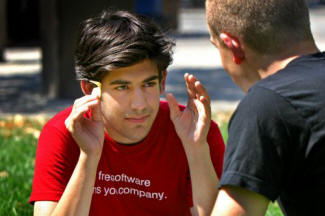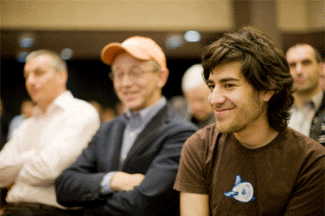Remembering Aaronby David Segal, DemandProgress.org <
[email protected]>
January 11, 2016
"What is the most important thing you could be working on in the world right now? … And if you're not working on that, why aren't you?"
Our cofounder Aaron Swartz asked that question (of others, but foremost of himself) and it expresses a sentiment that helps guide Demand Progress's work every day.
It was three years ago today that we lost Aaron — while he was awaiting trial on unjust charges, stemming, absurdly, from downloading academic articles. But his influence on our work endures, and he remains an inspiration to countless thousands across the globe.
Aaron is often remembered as a technologist and information-access activist. These are important causes to which he was an adherent — but not just for their own sakes: Aaron was not, nor is our team at Demand Progress, fundamentally cyber-utopian.
We believe that while knowledge helps build power, knowledge alone is not power enough to confront the monopolists who seek to own the Internet, the hedge fund managers and mortgage lenders who covet control of our financial system, and of Congress, or the corrupt criminal justice complex that destroyed Aaron, and undermines the lives of hundreds of thousands of Americans whose names don't make headlines and are not carried to your inbox through emails like this one.
To these ends, Demand Progress expanded our efforts in 2015 beyond our traditional work on Internet freedom, as we more generally strive to maintain some semblance of — and fight to expand — democracy and political equality in America.
As 2016 begins, we wanted to take a moment to share some of the recent work of which we are most proud — and of which you ought be too, for none of it would have been accomplished without your ongoing activism and financial support. We hope Aaron would take pleasure and pride in seeing all that we have been able to accomplish together. Please read on for the details.
INTERNET FREEDOMSecuring a Historic Win for Net Neutrality
In February, the FCC passed rules to preserve an open Internet, free from slow lanes and gatekeepers. Not since SOPA, the infamous censorship bill, has the Internet risen up in such force to defend itself. Before the vote, Demand Progress members took over four million actions — emailing lawmakers, attending rallies, and calling and meeting with members of Congress. In the wake of the vote, we have successfully fought against legislative attacks and lawsuits backed by Big Cable to destroy Net Neutrality.
Sinking the Comcast-Time Warner MergerThe Internet struck another major blow against Big Cable in April when the merger between Comcast and Time Warner — which would expand Comcast's reach to nearly two-thirds of American homes, with devastating consequences for consumer protections — was defeated. Hundreds of thousands of people, including Demand Progress members, spoke out against the merger, making it one of the most unpopular corporate consolidations in history.
Sunsetting Provisions of the PATRIOT ActLast spring, Demand Progress organized in opposition to the renewal of expiring provisions of the PATRIOT Act. This effort mobilized over a million contacts to Congress in support of aggressive surveillance reform. Our work helped shift the frame of the national debate, leading to a temporary sunset of provisions of the PATRIOT Act, blocking straight reauthorization of that law, and undermining attempts to weaken the USA FREEDOM Act.
ROOTSTRIKERS: FIGHTING OUT OF CONTROL CORPORATE POWER"There are a thousand hacking at the branches of evil to one who is striking at the root."
-Henry David Thoreau
In 2015, Demand Progress revamped its Rootstrikers project — which focuses on fighting the corrupting influence of money in politics and Wall Street’s attempts to rig the game. We are attacking the root problems that drive our country's skyrocketing economic and political inequality.
Leading the Fight Against Big Money in PoliticsRootstrikers organized a massive coalition, leading to more than 215,000 people taking action at FightBigMoney.com to demand presidential candidates adopt strong plans to counteract big money in elections. Then, we held President Obama's feet to the fire — he's told us for years he detests Citizens United, but nearly six years later hasn’t done anything about it.
We built PresidentObamasLegacy.org, and did a nifty integration with the White House's 'We the People' petition system. More than 116,000 signatures and over 8,000 phone calls later, the Obama Administration is on the hook to publicly reply to demands that he take executive action against secret money in politics.
Fighting the SEC's 'Soft-on-Wall-Street' ApproachRootstrikers took aim at the soft-on-Wall-Street record at the SEC — which should be the cop on the beat holding big bankers accountable, but too often has fallen down on the job. When we released a blockbuster report exposing SEC Chair Mary Jo White's incompetence and conflicts of interest, the press took notice. And when the Rootstrikers site NoMoreWallStreetInsiders.com collected signatures from more than 72,000 activists and drove more than 1,600 calls to the White House and SEC, we helped scuttle the nomination of yet another Wall Street insider who wanted us to trust him to regulate his old friends.
PROTECTING ACTIVISTS AND HUMAN RIGHTS
Blocking Expansion of the Computer Fraud and Abuse ActThe Computer Fraud and Abuse Act was passed in the 1980s — before the World Wide Web was invented — because Congress was spooked by the children's movie War Games. The CFAA has been wielded to quash online speech and threaten innovators and activists — including Demand Progress cofounder Aaron Swartz. This fall, Demand Progress led efforts to defeat an amendment that would have expanded the statute. We organized wide-ranging coalition efforts comprising tech experts, environmentalists, civil libertarians, and social justice activists to call attention to how the amendment could threaten activists who make use of run-of-the-mill online tactics. Key senators agreed to stand with us, and blocked the expansion.
Demanding an End to TortureWe successfully agitated for the release of the so-called "torture report," which confirmed and detailed America's use of torture around the globe during the post-9/11 era.
Defending WhistleblowersChelsea Manning has been sentenced to prison for more than three decades because she exposed evidence of war crimes. This tragedy has been compounded by the conditions of her confinement: This year we joined with other organizations to blow the whistle on attempts to put her in solitary for infractions like owning the wrong books and having a tube of expired toothpaste. More than 100,000 people took up the cause, and she was spared from such a sentence.
OPEN GOVERNMENT
Opening Access to Information
Because of our work, starting next year, Congress will publish information about all bills in a format that allows everyone to analyze the data, making it possible to track legislation, votes, and to figure out when special interests are trying to put their thumb on the scale.
Fixing CongressIt's no secret Congress doesn't work well — Demand Progress recommendations on how Congress should update rules, strengthen oversight, and increase access to reports have shaped reforms essential to dragging the government into the 21st century. And our work on rules reform helped prompt a major change in how members of committees are chosen — which is crucial, because personnel dictates policy.
Helping Citizens Track Secret Money in PoliticsWe've pushed the executive branch into making commitments that can yield real change — including getting the White House to commit to making nonprofits' tax returns available in a format enabling easier tracking of secret money entering our political system.
Thank you for having been an integral part of all of these efforts. We look forward to an inspired 2016 and continued work with all of you.
-David, Mark, Daniel, Sara, Kurt, and the whole Demand Progress team


